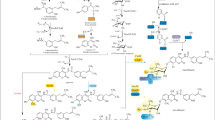Abstract
Methylobacterium rhodesianum was cultivated using an extended fed-batch regime. After treatments with N-nitroso-methyl-urea or X-rays, colonies showing an irregular morphology or increased heavy-metal sensitivity were selected. Electron micrographs of cells of isolated strains demonstrated the loss of the glycocalyx. Selectants and the parental strain yielded identical PHB amounts.
Similar content being viewed by others
References
Ackermann JU, Müller S, Lösche A, Bley T, Babel W (1995) Methylobacterium rhodesianum cells tend to double the DNA content under growth limitations and accumulate PHB. Biotechnol. 39: 9-20.
Adam D (1993) Ökologische Anforderungen an die produktion. In: Adam D, ed. Schriften zur Unternehmensführung 48: Wiesbaden: Verl. Dr. Th. Gabler, pp 5-31.
Babel W, Riis V, Hainich E (1990) Mikrobielle thermoplast: Biosynthese, eigenschaften und anwendung. Plaste Kautschuk 37: 106-115.
Bormann EJ, Leissner M, Beer B (1997) Growth and formation of poly(hydroxybutyric acid) by Methylobacterium rhodesianum at methanol concentrations of above 25 g l−1. Acta Biotechnol. 17: 275-288.
Chiellini E, Solaro R (1996) Biodegradable polymeric materials. Adv. Mater. 8: 305-313.
Geesey GG, Jang L (1989) Interactions between Metal Ions and Capsular Polymers. In: Beveridge TJ, Doyle RJ, eds. Metal Ions and Bacteria, New York: John Wiley & Sons, pp. 325-357.
Hänggi UJ (1995) Requirements of bacterial polyesters as future substitute for conventional plastics for consumers goods. FEMS Microbiol. Rev. 16: 213-220.
Hilliger M, Driesch D, Wulfes C, Menzel KD, Christner A, Rauchstein KD, Lehmann O (1997) Process development of a polyhydroxyalkanoate fermentation. In: Eggink g, ed. Intern. Symp. on Bacterial Polyhydroxyalkanoates. Davos: ISBN 0-660-17083-3. Poster 8/05.
Kim SW, Kim P, Hyuns S, Lee SY, Sinisterra JV (1996) High production of poly-ß-hydroxybutyrate from Methylobacterium organophilum under potassium limitation. Biotechnol. Lett. 18: 25-30.
Lee SY (1996) Plasic bacteria? Progress and prospects for polyhydroxyalkanoate production in bacteria. Trends Biotechnol. 14: 413-438.
Luzier WD (1992) Material derived from biomass/biodegradable materials. Proc. Nat. Acad. Sci. 89: 839-842.
Neubert M, Bormann EJ, Gebhardt HJ, Wolleschensky E (1982) Extended fed-batch-cultivation of exponential growing microorganisms. Acta Biotechnol. 4: 37-47.
Roberts IS (1996) The biochemistry and genetics of capsular polysaccharide production in bacteria. Ann. Rev. Microbiol. 50: 285-315.
Steinbüchel A, Aerts K, Babel W, Föllner C, Liebergesell M, Madkour MH, Mayer F, Peter-Fürst U, Pries A, Valentin HE, Wiezcorek R (1995) Considerations on the structure and biochemistry of bacterial polyhydroxyalkanoic acid inclusions. Can. J. Microbiol. 41(Suppl): 94-105.
Williamson DH, Wilkinson JF (1958) The isolation and estimation of the poly-ß-hydroxybutyrate inclusions of Bacillus species. J. Gen. Microbiol. 19: 198-209.
Yamamoto Y, Abe H, Doi Y (1996) Development in the area of medical or implantable polymers. In: Eggink B, ed. Intern. Symp. on Bacterial Polyhydroxyalkanoates. Davos: ISBN 0-660-17083-3. Plenary lecture.
Author information
Authors and Affiliations
Rights and permissions
About this article
Cite this article
Bormann, E., Roth, M., Linß, W. et al. Selection of capsule deficient strains of Methylobacterium rhodesianum producing polyhydroxybutyrate. Biotechnology Techniques 13, 539–544 (1999). https://doi.org/10.1023/A:1008904814522
Issue Date:
DOI: https://doi.org/10.1023/A:1008904814522




